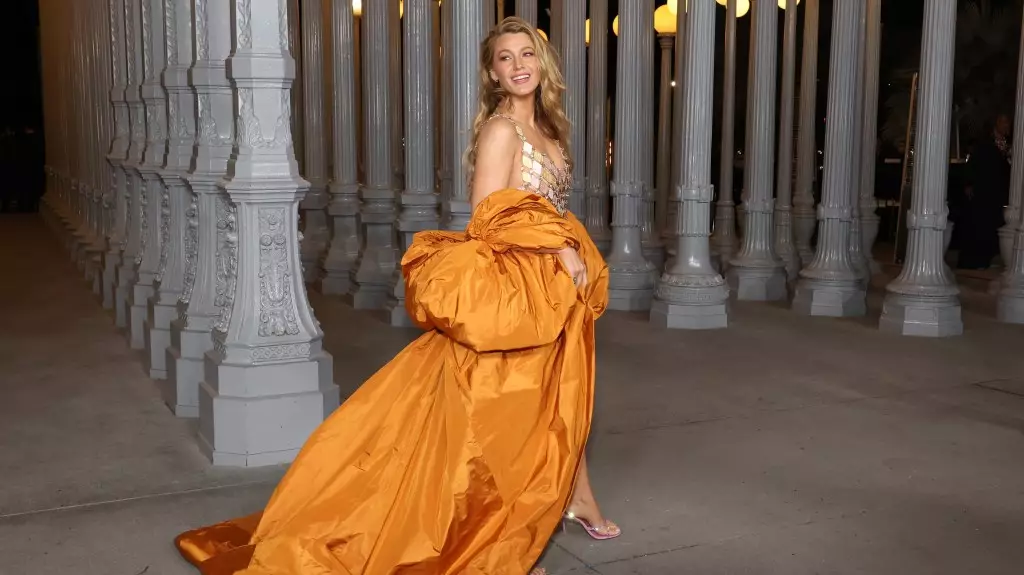In an unprecedented legal showdown that has captured the attention of Hollywood and the broader public alike, actress Blake Lively has brought forth allegations of sexual harassment against Justin Baldoni, her co-star and director in the adaptation of the popular novel “It Ends With Us.” This lawsuit, which not only claims misconduct but also outlines a sophisticated retaliatory campaign that allegedly targeted Lively’s professional reputation, serves as a stark reminder of the ongoing challenges faced by women in the entertainment industry.
According to court documents filed with the California Civil Rights Department, Lively asserts that the alleged harassment led her to make significant professional sacrifices, including withdrawing from hosting the highly anticipated 50th season premiere of “Saturday Night Live.” The pivotal moment for Lively came when she realized that public appearances would require her to address the incidents that transpired on set. This situation speaks volumes about the psychological toll that workplace misconduct can inflict on individuals, particularly women who already navigate a landscape fraught with scrutiny and prejudice.
The complaint details the immediate and substantial impact on Lively’s career, including the cancellation of a critical event for her haircare line in collaboration with Target. Such decisions, particularly in a high-stakes industry where public visibility is essential, highlight the broader ramifications of harassment claims—not just on the alleged victim, but on their business ventures and future opportunities.
The lawsuit delves into the alarming behavior exhibited by Baldoni, describing a meeting held to address his conduct after filming resumed post-guild strikes. Lively, alongside her husband Ryan Reynolds and Baldoni, discussed Baldoni’s “disturbing behavior,” which allegedly included inappropriate improvised scenes and troubling personal comments. This kind of environment, where an abuser feels comfortable enough to joke about HR meetings, illustrates an alarming culture of toxicity, wherein victims are often left feeling disempowered and vulnerable.
Such accounts not only frame the specific interactions between Baldoni and Lively but also serve as a broader reflection of the pervasive issues of sexism and entitlement in Hollywood. As Lively bravely steps forward, she encourages other individuals in similar positions to find strength in their voices, pushing for accountability and transformation within the industry.
In the wake of these serious allegations, Baldoni’s legal team has responded vehemently, asserting that Lively’s claims are unfounded. Their narrative paints her as desperate to mitigate the fallout from her own public relations struggles instead of confronting the truth of her actions leading up to the film’s release. Such a defense strategy often perpetuates a common tactic in harassment cases—victim-blaming—where the focus shifts from the accused’s behavior to the character and motivations of the accuser.
This pattern is not new and highlights the systemic issues women face when speaking out: not only must they confront their predators, but they must also brace themselves for accusations that often seek to undermine their credibility and integrity.
The aftermath of this lawsuit has not only cast a shadow over Baldoni’s career but has also led to tangible repercussions, such as him being dropped by his agency, WME. Furthermore, author Colleen Hoover’s public show of support for Lively speaks volumes in terms of solidarity within the creative community. In a time when the industry is undergoing significant scrutiny concerning harassment and misconduct, such alliances are crucial for reform and healing.
Lively’s courageous stance shines as a beacon of hope for countless others who may feel isolated in their experiences. This situation serves as a pertinent reminder of the cultural reckoning currently unfolding in the entertainment industry, where the voices of the marginalized are increasingly being heard, and systemic change is demanded.
As the lawsuit unfolds, one thing remains clear: Lively’s allegations are not merely a personal battle but part of a larger movement advocating for safer, more respectful working environments for all individuals in the entertainment sphere. The dialogue surrounding these claims stresses the importance of addressing workplace misconduct head-on. With each story shared, there is an opportunity for real change, ultimately shifting cultural norms and restoring dignity to those who have been silenced for far too long. The industry stands at a crossroads, and it is incumbent upon all stakeholders to ensure that the path forward prioritizes respect, safety, and accountability.


Leave a Reply